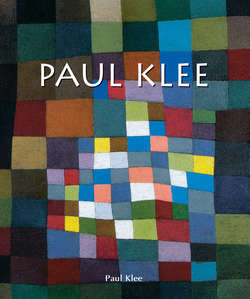Paul Klee

Реклама. ООО «ЛитРес», ИНН: 7719571260.
Оглавление
Paul Klee. Paul Klee
Extracts from Klee’s Diaries
Childhood, Adolescence and Early Academic Years
Munich 1881–1901
Travels in Italy
October 1901 to May 1902
The First Years of his Studies, Marriage, and Educational Trips
A Soldier in World War Two
1914–1918
Theoretical Writings
Nature as an Example
Art as Abstraction
Basics of Form and Composition
Linear-active
Linear-medial
Linear-passive
Linguistic analogy
Perspective
Construction in three dimensions
Lengthwise gradation
The horizontal
The scales
Asymmetrical balance
Structure (dividual articulation)
The representation of measure and weight
The chess board
Individual rhythms (individual structures)
The concept of structure in nature
Movement as the Highest Basis
The water mill [46]
The plant [47]
Circulatory system [48]
Earth, air, water [49]
Productive and receptive movement
Succession, or the temporal function of a picture – Symbols of the figuration of movement
The spinning top
The pendulum
The circle
The spiral
The arrow
Tonality
Contrasts in colour temperature (cold and warm colours)
Synthesis of tonality-movement and temperature contrast
The dimension of tone value
The development of movement
The infinite movement: the colour circle
Review
Отрывок из книги
Juvenile Self-Portrait – Free, 1910. Plume, pencil and black watercolour on linen on cardboard, 17.5 × 15.9 cm. Private collection, Switzerland.
I developed very early an aesthetic sensibility. Whilst I was still wearing skirts I was made to put on underwear that was too long for me, so that even I could see the grey flannel with the wavy red trimmings. When the doorbell rang I hid to keep the visitor from seeing me in this state (two to three years old).
.....
I have started a new life. And this time I’ll succeed. I lay low on the ground. All was permitted me I believed, my strength could be savoured to the utmost. I went to the fools’ dance, a dirty knave. The maiden’s love has freed me from such a figure. I recognised my misery, and that half expelled it. Fright pulled me together. I want to become serious and better. The kiss of the dearest woman has taken all distress from me. I will work. I will become a good artist. Learn to sculpt. My aptitude is primarily formal in nature. I carry this recognition with me.
Stuck thought he could advise me to turn to sculpture; should I wish to paint again later, I would find good use for what I had learned. Proof of the fact that he understands nothing about the realm of colour. And he advised me to go to Rümann. As a student of Stuck, I expected to be admitted there without difficulty. However, the old man asked me to pass an entrance examination. I begged to be exempted from it, for the very fact that I should be asked to take one was tantamount in my eyes – and rightly so – to having flunked. But my request got him all excited: “I myself once had to pass an entrance examination.” This had a royal sound. Then he submitted my drawing to sharp criticism; still, to a few of them he granted some merit. Finally I went away without accepting his position on the matter of the examination. Perhaps I did impress him a little after all. Maybe he expected to see me again?
.....